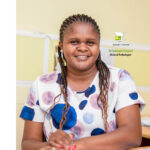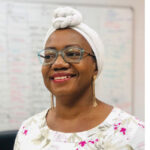‘Engineering not a men’s domain’ Dr Amutenya learnt that hard work pays
STAFF WRITER
Although Dr. Victoria Amutenya was never exposed to many professions while growing up, she wanted to be a teacher like her only role model at the time, – her mother. She learnt the virtue of hard work along the way, and when she finally made up her mind on the career she wanted, she settled for law or medicine. Fate took her to the medical field and she lived to talk about it.
Q: Tell us about yourself and who Dr Victoria M. Amutenya is.
A: I am a wife and mother to two beautiful girls.
Q: Your educational background?
A: Like most Namibians, our stories are very similar. I grew up in a village in northern Namibia, where I attended my primary and high school. I then moved to Windhoek to attend the University of Namibia (Unam-Premedical training).
I was accepted for a Bachelor of Medicine and Surgery (MBChB) program at the University of Pretoria in South Africa. After completion, I returned home to do a two-year internship and I worked in the anaesthesia department for a year after completing my internship.
I went back to the University of Pretoria to specialize in pathology (Medical Microbiology). I obtained a master’s degree in medical microbiology from the University of Pretoria, a Fellowship of the College of Pathologists in Microbiology from the Colleges of Medicine of South Africa (CMSA) as well as a post-graduate diploma in Tropical Medicine and hygiene from the University of Witwatersrand.
Q: What is your occupation and why did you choose it?
A: I am a Pathologist-Clinical Microbiologist. I am involved in the diagnosis treatment, and prevention of infectious diseases. I chose this occupation because infectious diseases remain a major cause of morbidity and mortality. I bridge the gap between clinicians and the laboratory to ensure that patients are treated optimally.
Q: Some people knew what they wanted to be when they grew up – and ended up there, then there is the rest of ‘us.’ In which group are you and how many ‘wrong turns’ did you make before arriving here? What lessons of any, were learnt along the way?
A: Growing up, I was in the rest of “us” group. But in my later years of high school, I knew that I wanted to be either a doctor or a lawyer. I then applied to UNAM, with my first choice being Pre-Medical training (as Medicine was not offered at the time), and my second choice being Law. I was then accepted into Pre-Medical training, and I am stuck with medicine.
Q: As a professional woman, do you have any role models that you look up to – both inside and outside your field?
A: There was little exposure to different careers for me growing up, and having my mother as a teacher, I aspired to be like her. I also learnt early on that I needed to work hard to get to where I wanted to be. Later in life, I met professors in my field that I looked up to, such as the late Prof. Nontombi Mbelle (may her soul rest in peace), as well as Prof.Anwar Hoosen who continue to inspire me.
Q: What challenges do you meet on the job, which are brought about by being female, and how do you tackle them?
A: Having to fulfill all the roles as a mother, wife, and professional everyday and ensuring that one strikes a balance. Also, to acknowledge the work done by women to ensure that we are also present at the table and are not excluded.
Q: How do you balance being a mother or wife and professional? What have you sacrificed (both personally and professionally) at each stage of your career?
A: It requires planning and prioritizing. There are times when one aspect (either personal or professional) requires more time than the other, so one learns to adapt. It also involves making sacrifices to attain certain goals.
Q: What advice you would give to a woman thinking of embarking on a profession like yours?
A: Dedication, hard work, and discipline take you a long way. It also requires a good support system.
Q: What does International Women’s Day mean to you?
A: Being aware of the historical background women faced, we are proud of their achievements, but a lot still needs to be done with issues facing women, such as Gender Based Violence as well as equal opportunities for all people.







